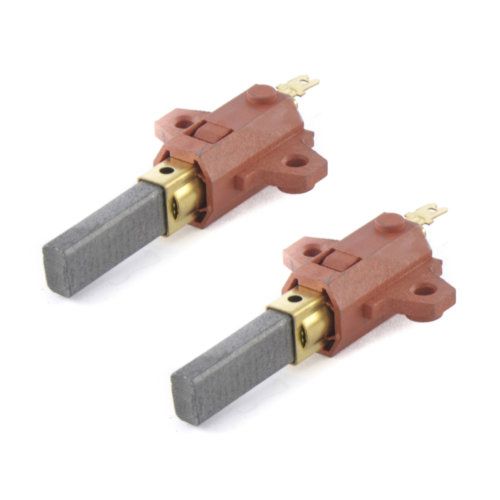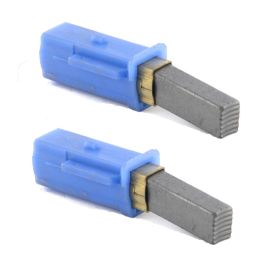Carbon Brushes

Dirt Devil Motor Carbon Brushes
How do I check & replace my carbon brush?
As with all other appliances, maintenance also plays an essential role in the case of central vacuums and their components, motor brushes or carbon brushes included. However, while most maintenance jobs can be carried out by homeowners themselves, the motor of any vacuum cleaner is better off in the hands of professionals.
As a rule, the carbon brushes on a central vacuum cleaner must be replaced if they are burned down to any length shorter than 3/16 of an inch. It should be noted that their standard length is 3/4 of an inch. As for the motor, its typical life expectancy is around 800-900 hours of use, the bearings or the armature usually failing thereafter. We have Vacuum Motor Brushes, Vacuum Cleaner Motor Brushes, Lamb Electric Motor Brushes & More available.
-
See full description below for a list of compatible motors. If your carbon brush is shorter than 3/16 of an inch, then it's time to replace them. For any additional questions or need assistance finding the right carbon brush for your Ametek motor please call us at 1-800-322-2965 ... Learn Moreabout Ametek Lamb Carbon Brushes 33423-1
$19.95 -
If your carbon brush is shorter than 3/16 of an inch, then it's time to replace them. If you have any question or need assistance finding the right carbon brush for your Ametek motor please call 1-800-322-2965 and one of our central vacuum experts will be happy to assist you. Learn Moreabout Ametek Lamb Carbon Brushes 33423-12
$19.95
Checking & Replacing Your Carbon Brush
The signs that your carbon brushes need to be replaced are usually quite clear. If the motor is operational, a big blue spark wrapping around the top of the armature, namely the commutator, is the most eloquent. While a small blue spark causes no reason for concern, a big one shouts replacement for it most certainly has burned down the carbon brushes. Should the commutator suffer serious damage, the motor itself will have to be replaced. On the other hand, if the motor is no longer operational, it may be simply because of the carbon brushes wearing out and not being able to conduct electricity anymore, which is the best-case scenario. Other scenarios may involve a damaged armature or a damaged mini breaker, in which case the purchase of a new motor or a new mini breaker, respectively is required. In the latter case, it is very important that the amperage of the new mini breaker matches that of the old one.
Although highly recommended that it be performed by professionals, the task of replacing the motor or motor brushes is not that demanding. Depending on the motor design, the screws which keep the carbon brushes into place may be placed under a black cooling fan cover, a sheet metal cover that wraps around the armature, or may be accessible only if the top cover of the motor is removed. However, they may not need to be removed but will simply pop out laterally upon the removal of a retainer clip as is the case with Premier motors. Once the level of wear has been determined based on the length of the black lead, which is initially one inch and should not reach below 1/4 inches, the whole brush unit will be replaced. It is mandatory that the flag terminal on the carbon brush stud be removed upon its replacement. This can easily be done using a pair of pliers and removing the outer motor brush casing. It is equally important that the metal casing of the brush and the armature do not touch. Once the new carbon brushes have been mounted, it suffices that the motor be operational at the half voltage for 30 minutes and they will adjust their position automatically. Finally, it should be noted that overheating tends to be a common problem with vacuum cleaners. However, an open vacuum inlet door or a hose can easily minimize this risk and prolong the life expectancy of the motor, which is the ultimate goal when it comes to vacuum cleaners and their proper maintenance.





Log In
Create New Account